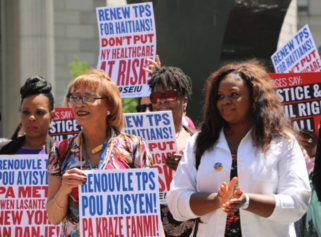
When the January 2010 magnitude 7.0 earthquake killed more than 200,000 Haitians, aid flowed in. Shocked by the dreadful TV images of the disaster, nearly half of American households contributed money to relief work in the country. And around the world many others joined them.
The United Nations estimates that since the earthquake international donors have pledged more than $10bn (£6.5bn) of aid to Haiti. Over half of that money has already been spent.
The US Congress has calculated that if one includes commitments running through to 2020, the pledges amount to $13.4bn. That includes a US government allocation of $4bn, of which $3bn has already been spent. The money helps keep thousands of foreign NGOs active in Haiti.
Culture of dependency?
Despite all this activity, some Haitians have never left the displacement camps that were set up immediately after the earthquake. Others live in slums that have no running water, electricity or sewage facilities.
Even if some families have never recovered from the earthquake, the aid agencies’ emphasis has shifted from emergency relief to long-term reconstruction projects.
The Clinton Foundation, one of the leading foreign agencies in the country, has been an active donor ever since the earthquake. While Bill Clinton served as the UN Special Envoy to Haiti, Hillary Clinton, both as US Secretary of State and subsequently through the Clinton Foundation, has tried to keep international attention focused on helping the country.
Critics of the aid programmes – including those run by the Clintons – argue that a culture of aid dependency has developed in Haiti and that government systems in the country are weak in part because international aid staff are performing functions that should be carried out by local officials.
A report by the US Institute of Peace once suggested that Haiti was a “Republic of NGOs” which were able to cream off local talent by offering higher salaries than the government could afford.
Other complaints include claims that most of the American aid money has been spent on contracts with American companies and that many aid agency employees cannot speak French or Creole.
There have also been cases of aid donations having been subjected to an agency’s administration charges before the envisaged aid project is handed on to another NGO that in turn imposes its overhead costs.
Read more at bbc.com


